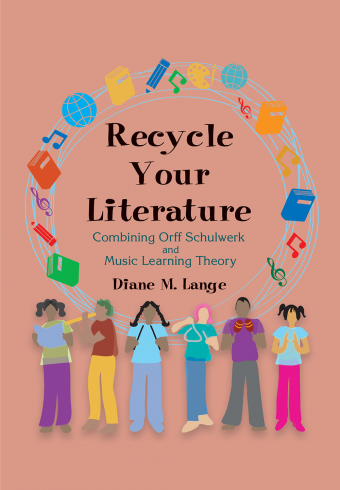This month I discovered a new text from Diane M. Lange, Recycle your Literature: Combining Orff Schulwerk and Music Learning Theory. You may recognize the author from a previous post from 2018 on combining these pedagogies in the review of Together in Harmony (the yellow cover) book. As I have more exposure to her career, I have been more and more convinced that her experience with teaching elementary music follows a meaningful and diverse sequencing that I am hoping to draw from in my own classroom.
I am going to share my thoughts on Part 2 which includes detailed lesson plans of the folk songs organized by grade(K-5). Her catalog of music includes a familiar favorite Are you Sleeping?, a few moderately familiar tunes: Canoe Song, Obwisana, Bow Belinda, and finally some more rare songs including: Postman, Round and Round, and Sandy Land. I really enjoy the variety of the music itself because although these songs are written in a variety of tonalities (Major, Minor, Dorian, Lydian) they are comfortable to sing and accessible to students of all ages. In previous years, I have not sung a wide variety of tonalities with early elementary but as a result of her lessons I can imagine how they can work with grades K-1.Another element to be commended are her tips for accommodations based on her experiences with these lessons. I appreciate the foresight of this section because as I teach them for the first time I can prepare for what to expect in any given group of students. The book is written on a topic that many music teachers can relate to, the practicality of recycling music and learning to asses students using a variety of modalities that are within the learning sequence.
A final thought about how I envision this working for me and my students-my plan needs to make sense with my pre-existing literacy methods from being a returning teacher in an established program. With regards to the labels from Music Learning Theory (discrimination and inference) I will instead organize using the stages from First Steps in Music: Tuneful Beatful, and Artful as well as Conversational the Steps #1-11. I have a self proclaimed eclectic approach which includes many important components of an intentional general music curriculum.
My hope is that any music teacher who has taken the time to read this will feel comfortable and willing to comment with their experience of recycling literature in General Music, or about how they combine research based programs in their teaching practice.
Musically,
Elia Sophia


No comments:
Post a Comment